Gifts for Student Aid On the Rise
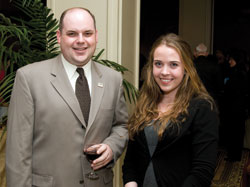
Jeremy Gosbee, BA '98, MBA '02, and the first Jeremy K. Gosbee Scholarship recipient, student Victoria Wright.
As a GW Colonial Connection caller, student Cynthia Figueroa talks to hundreds of alumni each year.
"As a scholarship recipient, it's incredibly rewarding to hear alumni talk about how the aid they received shaped their lives," Ms. Figueroa says. "So many people tell you that they could not have come to GW without a scholarship, and that's why they give back."
Since Steven Knapp became GW president in 2007, annual gifts for student aid have more than doubled. After sharing that access and affordability were among his top priorities, President Knapp announced the creation of the GW Power & Promise Fund for student aid in fall 2009.
"I was fortunate to come to GW on both merit- and need-based scholarships," says Jeremy Gosbee, BA '98, MBA '02, a GW Power & Promise Fund supporter and GW Alumni Association parliamentarian. "I would not have been able to attend GW or even stay as a student without the support I received."
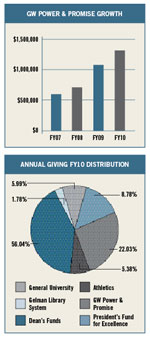 Vice President for Development and Alumni Relations Mike Morsberger says he is encouraged by the progress. "The increases that we have seen are certainly a promising first step. Each year that support for GW Power & Promise increases means more students who are able to enjoy all the opportunities that a GW education provides without the worry of how they are going to afford it."
Vice President for Development and Alumni Relations Mike Morsberger says he is encouraged by the progress. "The increases that we have seen are certainly a promising first step. Each year that support for GW Power & Promise increases means more students who are able to enjoy all the opportunities that a GW education provides without the worry of how they are going to afford it."
Annual gifts for the 2010 fiscal year totaled $5.98 million, an increase of 9 percent over the previous fiscal year. In
2010 GW also saw a 5 percent increase in annual donors.
GW's alumni, parents, friends, faculty, staff, and students gave generously to allocations across the university. The most popular designations were individual schools and the GW Power & Promise Fund, which raised more than $2 million and $1.3 million, respectively. Following these were the President's Fund for Excellence, which received $525,000 in gifts, and GW general university designations, which include annual gifts supporting athletics, student organizations, Greek life, and more.
"If there is one thing that I have learned in my time in annual giving, it's the collective impact of gifts of all sizes. Many people think that only large gifts make a difference. But the collective impact of these gifts can't be overstated. Last year, gifts of $100 and less totaled just under $1 million," says Rebecca Trump, director of annual giving. "Every gift matters, every year."
Staff and Faculty Visit Asia
Asia played host to several year-end events, including an alumni dinner in Shanghai, a dinner for alumni and parents in Beijing, and a brunch for GW students studying in China. Elliott School of International Affairs Dean Michael Brown and GW School of Business Dean Doug Guthrie also led discussions with GW community members in Korea and Tokyo about U.S.-Asia relations and foreign policy. To see more alumni event photos, visit the GW Alumni photo gallery on Flickr: www.flickr.com/photos/gwalumni.
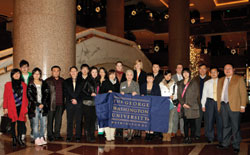
Associate Vice President for Alumni Relations and Development Adrienne Rulnick met with alumni for dinner in Shanghai.
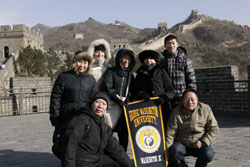
GW alumni, parents, and staff show their GW pride at the Great Wall of China in December
|
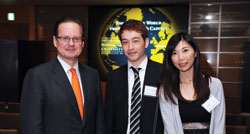
Elliott School of International Affairs Dean Michael Brown chatted with alumni and friends in Tokyo at a reception Nov. 30. The event for alumni, parents, and friends featured a discussion with Dean Brown titled "The Obama Administration and U.S. Foreign Policy: A Midterm Report Card."
|
Seeding Service: President Steven Knapp and Diane Robinson Knapp Endow Entrepreneurial Service-Learning Fellowship
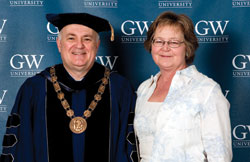 President Steven Knapp and Diane Robinson Knapp have made a gift to support George Washington University students' entrepreneurial drive to make the world a better place.
President Steven Knapp and Diane Robinson Knapp have made a gift to support George Washington University students' entrepreneurial drive to make the world a better place.
The Knapp Fellowship for Entrepreneurial Service-Learning—a new endowment that will provide support for students far into the future—will make it possible for exceptional GW students to bring creative concepts into practice in ways connected with their academic interests and training.
"Our hope is that this award will help students make a difference," Dr. Knapp says. "Since arriving at George Washington three years ago, we have been struck by our students' passion for changing the world and by the imaginative and intellectually serious way in which they harness that passion by developing concrete, innovative projects."
The award will recognize one or more innovative proposals each year and will provide support for their implementation. Up to $10,000 will be awarded this academic year.
Proposals for the first annual fellowship were due in February, and the fellowship will begin in summer or fall 2011. Awardees will work with the support and guidance of a faculty member.
GW students have a strong track record for turning their ideas into action. Examples include a sports empowerment program for girls in Uganda; a program to send low-income D.C. students to the World Cup in South Africa; and a summer program that brings disadvantaged high school students to D.C. for civic leadership education and the opportunity to meet with congressional and policy leaders.
These projects were designed by students to create solutions to the problems they saw in their local and global communities.
"This award can be a catalyst for new ideas and a way for students to turn their education into action," says Amy Cohen, executive director of GW's Center for Civic Engagement and Public Service.
Selection will be at the discretion of the provost, who will review recommendations made by a committee of faculty members and representatives from the Center for Civic Engagement and Public Service.
Sustainable Hospitality Scholarship Benefactor Meets with First Recipient
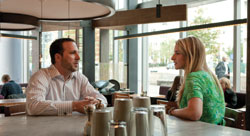
Founding Farmers restaurant co-owner Dan Simons, BBA '92, meets with inaugural Scholarship for Sustainable Hospitality recipient Lily Belter.
The Scholarship for Sustainable Hospitality was established as an annual scholarship funded by Founding Farmers, Farmers & Fishers, and the Vucurevich|Simons Advisory Group. Dan Simons, BBA '92, principal of VSAG, and Lily Belter, the scholarship's first recipient, met for the first time at Founding Farmers—the popular, eco-conscious restaurant near campus that VSAG opened in 2008. Ms. Belter, a sports event hospitality student, and Mr. Simons discussed what led them to GW, experiences in the classroom, and the value of student aid.
Dan Simons: Lily, I am really excited about this opportunity to meet you and learn about you. At first you were an intangible idea of an unnamed recipient, but now it has come to life, in person, which is the whole point of this scholarship, to help a real student.
Lily Belter: Well, I'm from Lakeville, Conn. It's a very small town with only one traffic light. GW is so different from back home.
DS: GW is a great place. I grew up in Boston and I visited D.C. when I was 12 and fell in love with the city. The whole college experience here was amazing.
LB: GW was my No. 1 dream school. I came down for the sports management program. I'm a junior and starting to get into the exciting classes, my major classes. I'm in the Sport Events Hospitality track.
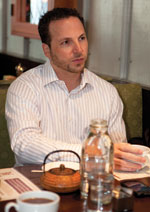 DS: I never would have put those together. What interested you in that area?
DS: I never would have put those together. What interested you in that area?
LB: I have always loved sports. My brother plays baseball in California at school, and I used to tag along to games. My dad was a coach for a summer league team when I was growing up, and I was always on the bench keeping score. You hear people talking about doing something that you really love and being happy. I had heard about sports management, but it's not a huge area of study and not a lot of schools offer it. But here, GW has a very specific program and I am actually getting to do things. We have teachers that have worked at some of the biggest sports management firms in the United States. We had a representative from the NFL Players Association come and speak in class. It is awesome.
DS: I love hearing that. I had teachers who were in the business community or who would bring in outside speakers. I think you learn so much from people who are actually doing. I have a business now, and I am able to look back at all of it and feel so grateful for that education. So tell me more about your career path, where do you think it's going to go?
LB: My classes have opened up so many aspects of the field, and it is hard to say specifically "this is the job I want to have." There is promotion and marketing, like the representatives from the NFL. I've also thought about working with the NCAA. I think anything on a grand scheme like that.
DS: That's good. It's a pretty exciting field, and I would imagine that there are not a lot of women, but I think you could handle that.
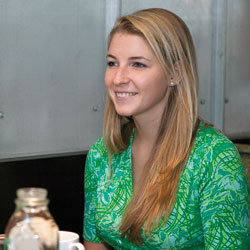 LB: I would like to think so. One of my professors started an NFL event where they bring in all the rookies and do photo shoots. It's cool to learn about because she started it, and that's something you can't teach out of a book. It's great to focus on learning from these experiences and how I can use them in my future because I'm not worrying about money all the time.
LB: I would like to think so. One of my professors started an NFL event where they bring in all the rookies and do photo shoots. It's cool to learn about because she started it, and that's something you can't teach out of a book. It's great to focus on learning from these experiences and how I can use them in my future because I'm not worrying about money all the time.
DS: When I was a freshman, one of my roommates had financial aid, and I saw his stress level. I watched him worry about taking four classes instead of five and having to make tough choices, like dinner or books? He needed that help, that financial support. I think that memory lodged in my brain. So now I have a business and the chance to be involved with GW and give back.
The whole scholarship idea just came together. The donation isn't just from me; it is from me and my business partner, Michael Vucurevich, and Founding Farmers and Farmers & Fishers restaurants. We made a commitment to do this every year for five years. But I just wanted to know that it was going to go to an actual person, and I was really interested in what our scholarship recipient would be going on to do. I am grateful to have met you face-to-face to see what I am helping to accomplish.
Empowering Female Soccer Players
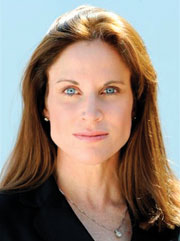 Successful businesswoman and influential community leader in Las Vegas, Nev., Maureen Peckman, BS '91, was painfully shy growing up. So shy, in fact, that she says she wonders how things might have been different without the confidence and friendships she gained through her participation in sports. Ms. Peckman was a member of both the women's rowing and women's soccer teams at GW and considers her student-athlete experience an integral part of her personal development.
Successful businesswoman and influential community leader in Las Vegas, Nev., Maureen Peckman, BS '91, was painfully shy growing up. So shy, in fact, that she says she wonders how things might have been different without the confidence and friendships she gained through her participation in sports. Ms. Peckman was a member of both the women's rowing and women's soccer teams at GW and considers her student-athlete experience an integral part of her personal development.
"Sports empower women and enable them to find their inner strength," Ms. Peckman says. "GW soccer did that for me in so many ways."
Now the chief emerging business officer for Cleveland Clinic Nevada, Ms. Peckman is paying it forward. This year, she established a first-of-its-kind scholarship for GW women's soccer players through a $100,000 gift to the GW Power & Promise Fund. "I was fortunate enough to receive a scholarship when I was at GW, and I couldn't have attended without it," she says. "By making this gift, I hope to enable more women to have the same great experience I did."
Ms. Peckman also decided to give back to the university because, for a shy girl from the Midwest, GW offered a new world of opportunities. She recalls some of her best memories as experiences that only GW could provide: participating in a biology lab at the Smithsonian, attending a lecture by a State Department employee that forever fueled her interest in foreign policy, and watching the president of the United States wave to her and her soccer teammates from his motorcade in 1990 as they practiced along Constitution Avenue just a few blocks off campus. "GW was this morass of real life, college life, D.C. life, and an athlete's life all rolled into one," she says.
Ms. Peckman has taken what she learned in sports to also give back to her local community. She is currently the chairman of the Nevada Community Foundation, commissioner of the Nevada Commission on Homeland Security, chairman of the Council for Conservation International, and a board member of the Agassi Foundation. She also runs a Nevada-based business group called the Council for a Better Nevada, which leverages private sector resources on behalf of quality-of-life issues like public education, transportation, and tax policy.
From The GWAA President
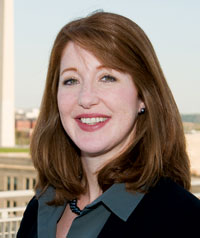
Laura Taddeucci Downs, BA '92, MA '95
Dear Fellow Colonials,
As a four-year student-athlete who attended GW on an athletic scholarship, I know first-hand the critical role of student aid. A scholarship allowed me to attend this great institution and I know many of you have similar stories.
As a former Colonials swimmer, I can relate most easily to the hundreds of student-athletes currently on scholarship through the 22 varsity sports. But the aid and the student success stories are not confined to athletics—three out of every five GW undergraduates receive financial aid from the university. Your generosity is critical for GW to continue to provide this level of support.
Now, I support athletics and academics at GW because I want to give back to the university that gave me so much—a scholarship, the education to establish a fulfilling career, and lifelong friends.
I am hoping that this year each of you will take the time to examine what GW means to you and how you can give back by volunteering your time, sharing your expertise, or making a financial contribution.
GW recently embarked on a significant effort to increase philanthropic support for student aid so that qualified students can attend the university and complete their studies regardless of their financial situation. This initiative—called the Power & Promise Fund for student aid—has seen great success in the number of donors and the level of financial support going toward scholarships (See Gifts for Student Aid on the Rise).
Scholarships are just one of the many areas at GW worthy of a gift. For something close to my heart, look no further than the transformation of the Charles E. Smith Center, which was made possible by donations from alumni and friends of GW. Student-athletes can take advantage of the expanded academic center, weight room, and updated sports medicine facility. The fan experience has also been improved during construction, and the facility now has more to offer for all the student and academic events it hosts throughout the year.
Whatever made your GW experience special can be enhanced through alumni support. Whether it is endowing a scholarship or making an annual gift to your favorite student organization or academic department, I encourage all alumni to contribute to the area at GW to which you feel most connected.
My story is that of a student-athlete, dual-degree holder, former GW employee, and now volunteer leader. I know there are so many more of you out there with interesting experiences to share. If you have already made a gift and would like to share your GW story or want to see what inspires others, visit ourgw.org.
To learn more about the Power & Promise Fund for student aid or make a gift, visit gwu.edu/give. Thanks for your support in helping to make GW an even better institution.
Sincerely,
Laura Taddeucci Downs, BA '92, MA '95
President, GW Alumni Association, 2009-11
alumni.gwu.edu/gwaa
Transforming a Center for Colonials
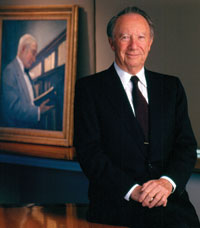
Willard Hackerman, president and CEO of Whiting-Turner Contracting, and his company have donated $1 million toward the transformation of the Charles E. Smith Center.
GW is closing in on its fundraising goal for the Charles E. Smith Center thanks to a generous donation from a university supporter.
Willard Hackerman and the Whiting-Turner Contracting Co. have donated $1 million toward the transformation of the Charles E. Smith Center, bringing the total raised by GW for the project to $8.9 million.
"I have admired Willard Hackerman's leadership and generosity for many years," GW President Steven Knapp says. "I am grateful that he is playing such an important role in the transformation of the Charles E. Smith Center."
Updates to the Charles E. Smith Center include an expanded academic center, weight room, and updated sports medicine facility; an Athletic Directors Club and Colonial Club for fans; and a new look for the building's exterior entrance and box office.
Mr. Hackerman is president and chief executive officer of Whiting-Turner, one of the contractors of the Charles E. Smith Center, which is currently in its final phase of construction.
Mr. Hackerman has worked for Whiting-Turner Contracting Co. since 1938. The company, which was founded in 1909 to build sewer lines, has grown into one of the nation's largest contracting firms with 29 U.S. offices and a portfolio ranging from high-profile shopping malls to prominent national landmarks.
The firm provides construction management, general contracting, and design/build services, primarily for large commercial, institutional, and infrastructure projects in the United States. A key player in retail construction, the company also undertakes such projects as theme parks, stadiums, and corporate headquarters.
Fostering Compassion in Medicine
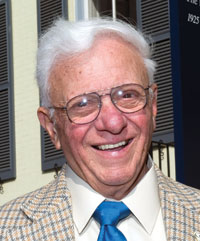
Dr. Sol Jay Hazan, MA '49, made a gift to the GW School of Medicine and Health Sciences to benefit third- and fourth-year medical students.
Driven by his belief that those who have benefited from philanthropy should give back to society, Sol Jay Hazan, MA '49, has made a gift to the GW School of Medicine and Health Sciences Power & Promise Fund for student aid. The gift benefits third- and fourth-year medical students who demonstrate academic achievement, compassion for patients, and financial need.
"I was always hard-pressed for money and I want to be sure future students don't have that worry and can concentrate on their studies," Dr. Hazan says. "Students must care about patients from the very start. Don't turn them away because they can't pay—compassion has to carry through in everything we do."
Upon his return from World War II, Dr. Hazan found himself at GW. It was Dr. Carlton Treadwell, an associate professor of biochemistry, who accepted Dr. Hazan as his first master's candidate and provided him with much needed employment as a lab assistant. Under the tutelage of Dr. Treadwell, Dr. Hazan discovered his aptitude for biochemistry and medicine.
When Dr. Hazan decided to pursue a degree in medicine, Dr. Treadwell found him a position as a research assistant and part-time medical student with a colleague, Dr. Sam Singal, at the Medical College of Georgia.
"These two individuals," says Dr. Hazan, "were the instrument of my successful life journey and the core belief that we must continue the giving in any way we can." After his father in California had a stroke, Dr. Hazan moved to the West Coast and completed his medical degree at the University of Southern California.
His career has included managing his own practice; directing research at two major pharmaceutical companies; serving as the commanding officer of an Army health facility in Germany; as a ship surgeon with the U.S. Coast Guard; and as head of medicine and health safety for the first nuclear ship, the N.S. Savannah. He published his autobiography, Looking Back at My America, in 2002.
He hopes Hazan Scholars will demonstrate a philanthropic spirit as they progress through their careers. "It's important that they remember how difficult their financial situation was when they have income to give back. Giving back to the university so other students can continue their education is the only way to advance discovery and science."
In 2010, Dr. Hazan returned to GW for the first time since earning his degree in 1949. There he found a new hospital, a greatly expanded campus, and residence halls (he lived in a rooming house during his time at GW). His academic building on H Street no longer exists.
"GW has grown tremendously," he says. "I was very impressed."

 Vice President for Development and Alumni Relations Mike Morsberger says he is encouraged by the progress. "The increases that we have seen are certainly a promising first step. Each year that support for GW Power & Promise increases means more students who are able to enjoy all the opportunities that a GW education provides without the worry of how they are going to afford it."
Vice President for Development and Alumni Relations Mike Morsberger says he is encouraged by the progress. "The increases that we have seen are certainly a promising first step. Each year that support for GW Power & Promise increases means more students who are able to enjoy all the opportunities that a GW education provides without the worry of how they are going to afford it." 



 President Steven Knapp and Diane Robinson Knapp have made a gift to support George Washington University students' entrepreneurial drive to make the world a better place.
President Steven Knapp and Diane Robinson Knapp have made a gift to support George Washington University students' entrepreneurial drive to make the world a better place.
 DS: I never would have put those together. What interested you in that area?
DS: I never would have put those together. What interested you in that area?  LB: I would like to think so. One of my professors started an NFL event where they bring in all the rookies and do photo shoots. It's cool to learn about because she started it, and that's something you can't teach out of a book. It's great to focus on learning from these experiences and how I can use them in my future because I'm not worrying about money all the time.
LB: I would like to think so. One of my professors started an NFL event where they bring in all the rookies and do photo shoots. It's cool to learn about because she started it, and that's something you can't teach out of a book. It's great to focus on learning from these experiences and how I can use them in my future because I'm not worrying about money all the time. Successful businesswoman and influential community leader in Las Vegas, Nev., Maureen Peckman, BS '91, was painfully shy growing up. So shy, in fact, that she says she wonders how things might have been different without the confidence and friendships she gained through her participation in sports. Ms. Peckman was a member of both the women's rowing and women's soccer teams at GW and considers her student-athlete experience an integral part of her personal development.
Successful businesswoman and influential community leader in Las Vegas, Nev., Maureen Peckman, BS '91, was painfully shy growing up. So shy, in fact, that she says she wonders how things might have been different without the confidence and friendships she gained through her participation in sports. Ms. Peckman was a member of both the women's rowing and women's soccer teams at GW and considers her student-athlete experience an integral part of her personal development. 

